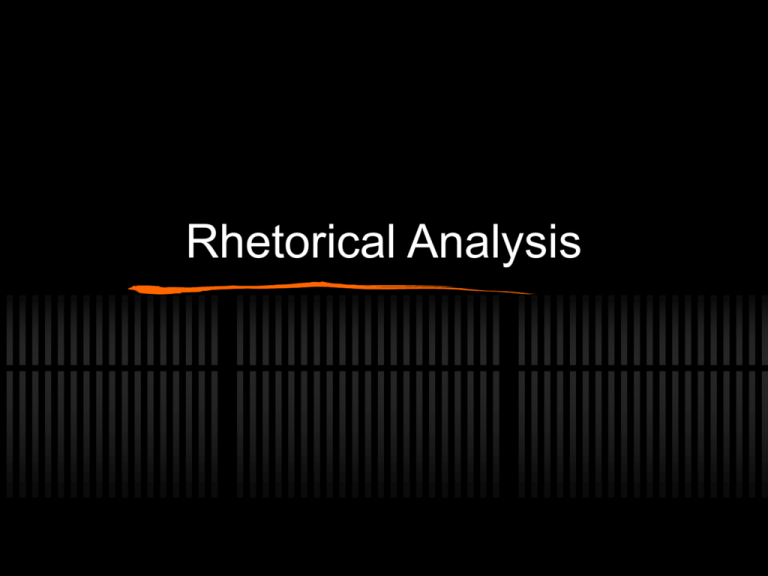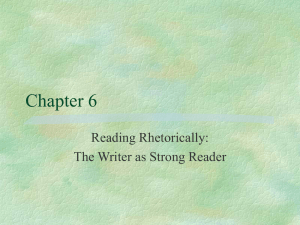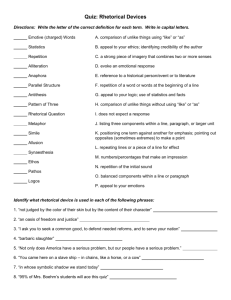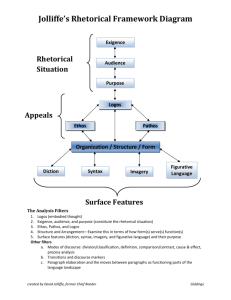Rhetorical Analysis
advertisement

Rhetorical Analysis “A way of seeing is also a way of not seeing”- Kenneth Burke When writers write rhetorically, they are aware that they are writing to an audience for a purpose within a genre. What makes a message successful or unsuccessful in achieving its intended effect? Rhetorical Theory The study of how human beings use language and other symbols to influence the attitudes, beliefs, and actions of others. “The symbolic means of inducing cooperation in beings that by nature respond to symbols.”Kenneth Burke Involves both inquiry and persuasion. “The ability to see, in any particular case, all the available means of persuasion.”-Aristotle Aristotle’s Rhetorical Appeals Logos: Appeal to reason. Refers to the quality of the message itself. Is the message consistent? Is it clear? Are the reasons logical? Ethos: Appeal to the character of the writer. Is the writer credible and trustworthy? Pathos: Appeal to the sympathies, values, beliefs and emotions of the audience. This is Aristotle This is not Aristotle Reading Rhetorically Ability to listen to the text, recognize parts and functions, and to summarize ideas. Ability to formulate a strong response to text by interacting with it, either by agreeing with, interrogating, or actively opposing it. With the grain: See the world through author’s perspective. Against the grain: Question its points, analyze limits of argument. When reading ask questions about the author’s purpose, genre, and motivating occasion. Write in the margins. Criteria for an effective summary Represent the original article accurately and fairly. Be direct and concise, using words economically. Remain objective and neutral. Only reveal author’s perspective. Give the article balanced and proportional coverage. Use your own words to express author’s ideas. Keep your reader informed through attributive tags (such as according to, or the author argues...). Include key quotes. Unified and coherent. Rhetorical Analysis Part 2 -Summaries -Audiences -Genres -Styles -Credibility (or lack thereof) Questions about the audience… When we write, we tend to have an ideal reader or set of readers in mind. If you know who the intended audience is, it makes it easier to see where evidence and credibility is lacking. One immediate question to ask: Where was the text published? But you might not always have access to this information. Are you a part of the author’s intended audience? Sometimes as readers, we can feel excluded because of our gender, class, ethnicity, sexual orientation, political and religious beliefs, etc Ex: Many people feel that a lot of pre- and early 20th century authors assumed that all their readers shared the same male-oriented values, and, in fact, as a result, the entire genre of feminist literary criticism arose to question and explain this assumption. When you differ significantly from the text’s assumed audience, you can use this difference to question the author’s underlying assumptions, values, and beliefs. Writing Style How do the author’s language choices contribute to the overall impact of the text? Does the author use any metaphors, similes, or poetic language? Anecdotes or vignettes? Epigraphs? Some readers might be put off by this style, others attracted to it. Is the diction elevated or commonplace? Describe the tone of the writing… Tone Diction and syntax often dictate what the author's attitude toward his subject is at the time. An example: “I surveyed the classroom of dolts, congratulating myself for snatching the highest test grade, the smug smirk on my face growing brighter and brighter as I confirmed the inferiority of my peers.“ Gently critical, elevated, pessimistic, contemplative, vehement, self-assured, lighthearted, didactic, impassioned, conversational, Logos Do you see any flaws or fallacies in the argument? The red herring: raising an unrelated or irrelevant point to deliberately throw an audience off track. An example… Q: As president, will you make sure our wounded veterans receive the proper health care? A: Let me tell you why I love our troops. They’re out there putting their lives on the line everyday to make sure we’re safe. That’s what we should all aspire to be like. Next question. Credibility and Evidence Do you think the author is knowledgeable and reliable? Explain why or why not in your paper? An arrogant tone, for instance, usually indicates that the author is not reliable or knowledgeable. When we spend all our time badmouthing and attacking the opposing view, that you usually means that we don’t have a whole lot to say for ourselves. However, if the author provides a lot of evidence, if she cites numerous sources, and admits the limits of her own argument, then we can be sure that the writer has thought carefully and fairly about her subject. When we evaluate evidence, we should look for sources that are specific and up-to-date. Pathos Does the author use vivid descriptions, short narratives, scenarios, or figurative language to tap the emotions and sympathies of the audience or appeal to their values and beliefs? Are these appeals to pathos fitting or excessive and heavy-handed? Questions for Developing Your Own Views about the Text’s Subject Matter Which of the author’s points do you agree with? What new insights has the text given you? Which of the author’s points do you disagree with? What gaps or omissions do you see in the text? What has the author overlooked? What questions or problems does the text raise for you? How has it troubled you or expanded your views? In what contexts can you see the usefulness of the text? What applications can you envision for it? THE END!!!!







